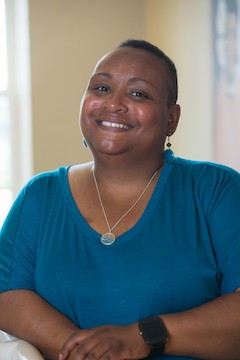BookChat with Le’Trice D. Donaldson, author of Duty Beyond the Battlefield
 I was pleased to spend some time recently with a book by historian Le’Trice D. Donaldson, author of Duty Beyond the Battlefield: African American Soldiers Fight for Racial Uplift, Citizenship, and Manhood, 1870-1920, published by Southern Illinois University Press (find out more about it here).
I was pleased to spend some time recently with a book by historian Le’Trice D. Donaldson, author of Duty Beyond the Battlefield: African American Soldiers Fight for Racial Uplift, Citizenship, and Manhood, 1870-1920, published by Southern Illinois University Press (find out more about it here).
CM: Can you start by telling me a little about your title?
LD: The title is from a speech given by Sgt. Vance Marchbanks in 1931 to a group of Black log workers and veterans. He spoke directly to this audience to encourage them to take their roles as veterans to serve their community, in spite of Jim Crow.
CM: The book picks up at 1870 rather than in the immediate aftermath of the Civil War. What was so important about that date?
LD: I chose 1870 because that is the chronology for the Indian/Frontier Wars and I wanted to center the timeline for the book between official military conflicts, rather than Reconstruction and military conflicts. The book would’ve been much longer.
CM: You say “the African American soldier of the second half of the nineteenth century is one of the most misinterpreted figures in American military history.” Why is that?

LD: The myths and narratives surrounding these men usually center on them serving in the military because it was a steady paycheck. The conversations never delve into the power and sense of honor and duty these men felt serving not for themselves, but for their community. Their identity and masculinity was tied directly to the uniform.
CM: You wrote that “many blacks believed that their rights of citizenship had been earned through their participation in the Civil War,” but as your book suggests, many black men continued to serve in the military because they felt like they needed to keep earning those rights. How did military service help?
LD: Military service is a right of an American citizen. Their service was a demonstration and a protest the numerous legal and extralegal means to suppress Black citizenship rights.
CM: The postwar opening of the west opened a lot of opportunities for African Americans. How did military service help blacks realize some of that potential?
LD: There is power in being able to relocate and create safe spaces because they could protect and provide for their communities.
CM: By the turn of the century, “Black soldiers rarely fought for only selfish motives: they fought for every black man’s manhood and citizenship and for all African Americans to have a better chance to achieve the American dream.” This reminded me a lot of the Irish who served in the Civil War: they fought because they felt they had something to prove. Those were two very different roads, though.
LD: Yes, African American participation in the Civil War revolved around them actively participating in their own liberation, not trying to prove anything. They believed themselves to be American and needed to fight to free the millions of enslaved.
CM: You say that fighting in WWI was “about more than just a way to save democracy” for black men. What was at stake then for the African-American community?
LD: WWI was about holding a mirror up to America and pointing out the harsh reality and hypocrisy of American domestic policies. Also, they fought for liberation and to push back against the persistent doubts about the place of Blacks in American society. White politicians kept referring to the “Negro problem” and Blacks fighting in WWI not only as soldiers, but as officers as well, directly supported a key part of the Civil Rights agenda of the NAACP.
CM: World War I offered a “promise of democracy” for African Americans that the U.S. government reneged on. How was the reaction of blacks to that collapsed bargain different than their reaction to the collapse of Reconstruction?
LD: The reaction was more militant and radical. They were not only willing to fight back against racial violence; they were also willing to leave. Black veterans were key figures in the Garveyite movement.
CM: And here are a few short-answer questions: What was your favorite source you worked with while writing the book?
LD: My favorite source as a speech by Charles Young, entitled, “Look to the Red Gods of Old.” He gave it to Liberian soldiers he trained.
CM: Who, among the book’s cast of characters, did you come to appreciate better?
LD: I really grew to appreciate Chaplain Henry V. Plummer. He was the first African American chaplain in the regular Army.
CM: What’s a favorite sentence or passage you wrote?
LD: The first paragraph of the book describing the struggle of Corporal Isaiah Mays.
CM: What modern location do you like to visit that is associated with events in the book?
LD: Fort Douglas in Salt Lake City, Utah.
CM: What’s a question people haven’t asked you about this project that you wish they would?
LD: I wish people would ask more about Henry Flipper.
GREAT POST! I’d love to break bread with this lady. I always hated the “steady paycheck” narrative. The irony is that southern whites post Civil War also embraced military service for it’s perceived redemptive qualities, in percentages far beyond their share in the population. It is a tragedy that this nation’s armed forces became segregated, the experience of continually serving side by side with black soldiers would have done all of us good!